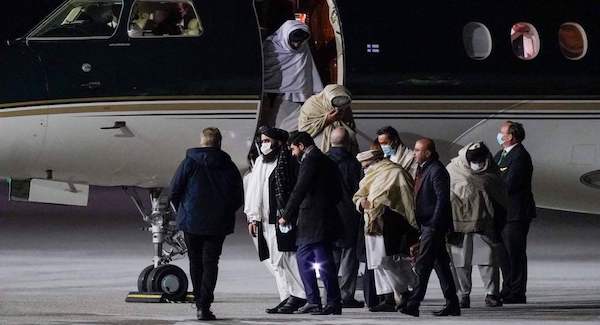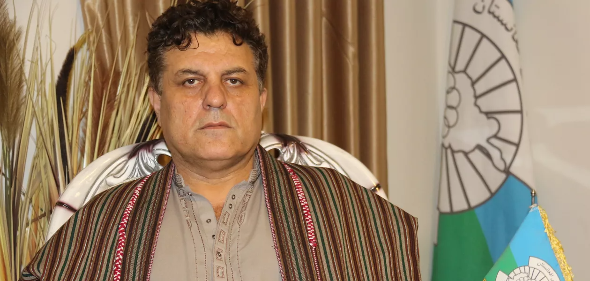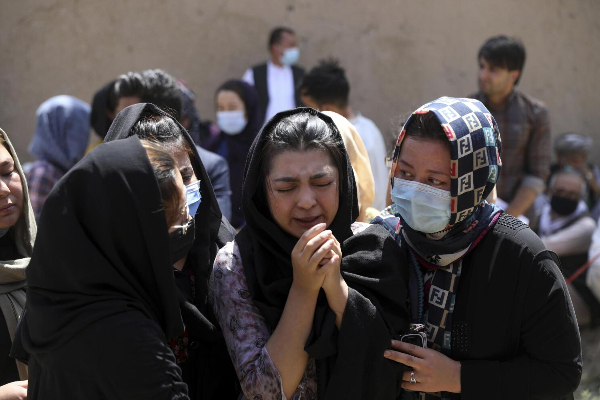
Taliban representatives arrive in Gardermoen, Norway, on January 22, 2022, for talks with Western representatives on human rights and emergency aid. (Photo by AFP)
A delegation of the Taliban, the first to visit Europe since the group came to power in Afghanistan, has begun its first day of talks in the Norwegian capital, Oslo, with the Afghan civil society.
The Taliban delegation, headed by acting Foreign Minister Amir Khan Muttaqi, started on Sunday its three days of talks with Western government officials and Afghan civil society representatives, including women activists and journalists from Afghanistan and from the Afghan diaspora. The Norway-brokered talks focused on human rights issues and the humanitarian crisis in Afghanistan, ahead of highly-anticipated meetings with Western officials.
Afghanistan is grappling with its worst humanitarian crisis, as the United States seized nearly $9.5 billion in assets belonging to the Afghan Central Bank after the Taliban took power in August 2021. The Taliban have repeatedly called for the release of the assets, but Washington has rebuffed the call. Many of the USís allies and Western governments have also largely suspended their financial assistance to Afghanistan ever since. Aid agencies and the UN have estimated that more than half of Afghanistanís 38 million population is expected to face hunger this winter.
The Taliban, who had previously ruled Afghanistan from 1996 to 2001, took power again on August 15 as the US was in the middle of a chaotic troop withdrawal. The group announced the formation of a caretaker government on September 7. No country has yet recognized their rule. Since then, the Taliban have been struggling to contain a deepening economic crisis.
However, their efforts to stabilize the situation have so far been undermined by international sanctions, as banks are running out of cash and civil servants are going unpaid.
On January 21, Norwegian Minister of Foreign Affairs Anniken Huitfeldt stressed that the closed-door talks would "not represent a legitimization or recognition of the Taliban."
"But we must talk to the de facto authorities in the country. We cannot allow the political situation to lead to an even worse humanitarian disaster," she added. "We are extremely concerned about the grave situation in Afghanistan, where millions of people are facing a full-blown humanitarian disaster. In order to be able to help the civilian population in Afghanistan, it is essential that both the international community and Afghans from various parts of society engage in dialogue with the Taliban. We will be clear about our expectations of the Taliban, particularly as regards girlsí education and human rights, such as womenís right to participate in society."
On Monday, the Taliban delegation is scheduled to meet with representatives of the United States, France, Britain, Germany, Italy and the European Union (EU), while Tuesday will be dedicated to bilateral talks with Norwegian officials.
On Saturday, Taliban spokesman Zabihullah Mujahid told AFP that Taliban hoped the talks would help "transform the atmosphere of war... into a peaceful situation."
About 80 percent of the Afghan budget was financed by international aid until August, when it was halted due to the Talibanís takeover of Afghanistan as huger, according to the UN, currently threatens 23 million Afghans, or 55 percent of the whole population. The world body also says it needs $4.4 billion from donor countries this year to deal with the humanitarian crisis in the Asian country. "It would be a mistake to submit the people of Afghanistan to a collective punishment just because the de facto authorities are not behaving properly," UN Secretary General Antonio Guterres said on January 21.
Back in December, the UN Security Council unanimously adopted a US-proposed resolution to help humanitarian aid reach Afghans, while seeking to keep funds out of the Taliban hands. That resolution was welcomed by the Taliban authorities as a "good step."
The Taliban have warned Western diplomats that insisting on sanctions as a means to pressure their governance could undermine security and trigger a wave of economic refugees.
The UNís special representative for Afghanistan has already warned that the country is "on the brink of a humanitarian catastrophe" and that its collapsing economy is heightening the risk of terrorism.
LINK: https://www.ansarpress.com/english/26366
TAGS:






























 Ghani Removed From UN Heads of State List
Ghani Removed From UN Heads of State List 




